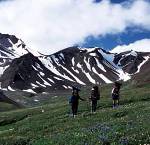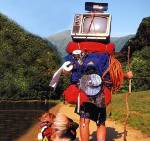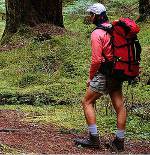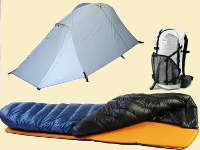
Hiking Styles
 Nearly all my multi-day hiking has been with lesser-skilled youth. My goal with these trips is to keep them safe, teach them skills, and help them enjoy the adventure. That meant packing more equipment, food, and what-if items than would be needed if everything went perfectly.
Nearly all my multi-day hiking has been with lesser-skilled youth. My goal with these trips is to keep them safe, teach them skills, and help them enjoy the adventure. That meant packing more equipment, food, and what-if items than would be needed if everything went perfectly.
When hiking with other skilled and experienced hikers, less equipment is needed which means a lighter pack. The amount of gear and weight of pack basically determines the style of hiking your group will do.
Hiking Styles
 There are no absolute definitions of specific packing and hiking styles, but there are categories used to describe the general styles.
There are no absolute definitions of specific packing and hiking styles, but there are categories used to describe the general styles.- Backpacking - carrying all gear you'll need throughout a multi-day hike.
- Thru-hiking - backpacking an entire designated trail in one season, usually from one end to another, but there are alternate itineraries.
- Slackpacking - doing short hikes on portions of a long trail, carrying only the bare essentials rather than a full pack. Someone else may transport your pack by vehicle to the next trailhead for you, or pick you up and give you a place to stay the night.
- Freehiking - hiking cross-country with no trails
- Speedhiking, Fastpacking - hiking a designated trail with the goal of shortest possible time
- Soloing - hiking alone
- Peakbagging - climbing to the summit of a collection of mountain peaks
Pack Weight
 It is common to refer to pack weight in a number of different ways which, unfortunately, muddy the waters and make the transition to lighter packs more confusing:
It is common to refer to pack weight in a number of different ways which, unfortunately, muddy the waters and make the transition to lighter packs more confusing:
- BPW - Base Pack Weight - everything in your pack except consumables (food, water, and fuel). Does not include what you are wearing. The consumable weight will change over the course of the trip.
- TPW - Total Pack Weight - BPW + consumables.
- TBW - Total Base Weight - BPW + everything you're wearing. Does not include consumables.
- SOW - Skin Out Weight - everything except your naked body weight.
- TW - Total Weight - everything, including you. This is all the weight you need to move up the trail. A 170lb person with a 50lb pack would have the same TW as a 200lb person with a 20lb pack (and would need to work really hard!)
 Many people spend way too much time shrinking their BPW so they can think of themselves as UltraLight hikers, but that's a waste of effort. The goal should be to reduce the entire amount you need to move up the trail (the TW) in order to have a more enjoyable hike, but still remain safe and as comfortable as your enjoyment requires.
Many people spend way too much time shrinking their BPW so they can think of themselves as UltraLight hikers, but that's a waste of effort. The goal should be to reduce the entire amount you need to move up the trail (the TW) in order to have a more enjoyable hike, but still remain safe and as comfortable as your enjoyment requires.
The general hiking/packing categories are:
- SuperUltraLightweight - under 5lb BPW
- UltraLightweight - under 10lb BPW
- Lightweight - under 20lb BPW
- Traditional - under 30lb BPW
- Heavy - over 30lb BPW
Benefits of Lighter Weight
 I've not met anyone that does not agree a lighter pack means a better hike. Some reasons to go light:
I've not met anyone that does not agree a lighter pack means a better hike. Some reasons to go light:
- Less tired at the end of the day
- Cover more miles of trail and see more sights
- Travel more challenge terrain
- Less stress on legs lowers probability of injury
- Less food and time needed to cover a certain distance
- Extend the hiking years for older hikers
And, a few common concerns of going too light:
- Unprepared for emergency situations, such as injuries or bad weather
Include adequate first aid and weather protection. - Sacrifice of too much comfort, such as sleeping pad and warm clothes
Carrying 25lb instead of 50lb is more comfortable all day. - Lighter gear costs more
Lighter, stronger materials are more expensive - but check into making your own.
Big Three
 The best way to lower your equipment weight is to concentrate on reducing three key areas and then work on from there. These three areas account for the majority of your pack weight:
The best way to lower your equipment weight is to concentrate on reducing three key areas and then work on from there. These three areas account for the majority of your pack weight:
- Shelter - tents, tarps, or bivys are all options for shelter depending on your preferences, insects, and expected weather.
- Sleep System - sufficient insulation from the ground and air to keep you warm all night is the requirement. There are dozens of sleeping pads and sleeping bags from which to choose, using different insulation types and amounts resulting in different temperature ratings and comfort levels.
- Pack - the pack in which you carry everything weighs something itself. Some framed packs may weigh 7 or more pounds. An ultralight frameless pack can be under 1 pound. There are many choices in the sub-3 pound range.
Ask Me about Hiking Styles!
All Comments:
Mar 23, 2017 - Alex from Germany
thank you! you did a great Job with all These informations
Ask a Question
Find more Hiking Resources at www.HikingDude.com


 Choosing a Shelter
Choosing a Shelter Selecting a Sleep System
Selecting a Sleep System
Follow Me
Recent Comments